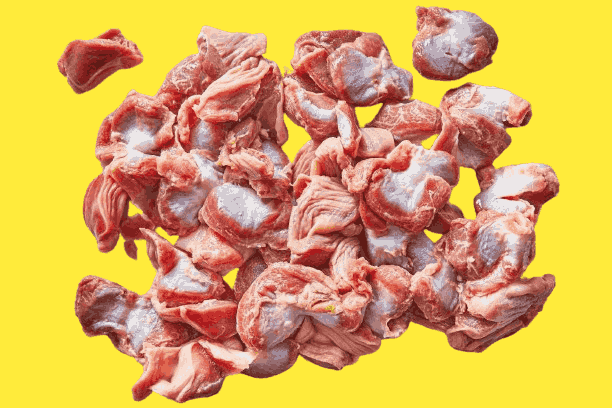Can Dogs Eat Chicken Gizzards? Benefits and Risks
Finding balanced, nutritious food alternatives for our beloved pets is something pet owners are always on the hunt for. Chicken gizzards are one choice that seems to pique people’s interest. A chicken’s digestive tract includes these little musculoskeletal organs, which have a distinct flavor and texture. Is it OK to feed dogs chicken gizzards? The pros and cons of feeding your dog chicken gizzards are discussed in this article.
Understanding Chicken Gizzards
Dogs may benefit from the nutrient-rich delicacy that is chicken gizzards, which people tend to ignore. The protein, iron, and B vitamins found in these little musculoskeletal organs are second to none. The natural taurine in the meat helps dogs’ hearts stay healthy, while the glucosamine and chondroitin in the cartilage make it good for their joints. Chewing gizzards is a great way to clean your teeth, as it cuts down on tartar and plaque. While gizzards are delicious, it’s important to introduce them slowly to prevent allergies, gastrointestinal problems, and bacterial infections. Before adding new items to your dog’s diet, it’s always a good idea to talk to your doctor.
Benefits of Feeding Chicken Gizzards to Dogs:
Nutrient-Rich Protein Source:
Canines can benefit from eating chicken gizzards because they are a rich source of nutrients. Because of the abundance of vital nutrients they contain, including protein, iron, and B vitamins, they are important for general well-being. Chicken gizzards are a great way to boost your dog’s physical health since they are a good source of protein, which is essential for building muscle.
Natural Taurine Boost for Heart Health:
The heart-healthy amino acid taurine is found naturally in chicken gizzards, making them a perfect choice for a boost. By adding these organs to your dog’s food, you may help keep his circulatory system healthy and lower his risk of cardiovascular disease and other complications.
Joint Support from Glucosamine and Chondroitin:
Glucosamine and chondroitin, two important components of cartilage, are found in chicken gizzards and are recognized for their ability to support joints. Gizzards may help dogs, particularly those with a history of joint problems like arthritis or hip dysplasia, keep their joints in tip-top shape.
Dental Health Benefits Through Chewing:
Dogs have two benefits from chewing: improved oral health and a pleasurable activity for the canine. Chicken gizzards are a natural technique to get people to chew, which in turn helps get rid of tartar and plaque. By doing so, you may promote oral health and lessen the likelihood of problems like gum disease and foul breath.
Digestive Well-Being with Dietary Fiber:
Dietary Fiber for Digestive Health: Chicken gizzards are high in fiber and may help dogs maintain healthy digestive systems. Consuming enough fiber aids in the regulation of bowel movements, which in turn helps to avoid constipation and promote digestive health.
Risks of Feeding Chicken Gizzards to Dogs:
Cholesterol Concerns:
Dogs should not be given chicken gizzards due to the high cholesterol level that they contain. Although a dog’s food should include some fat, too much cholesterol may be harmful, especially for canines that already have cardiac problems.
Gastrointestinal Upset:
Chicken gizzards are one of several novel meals that might cause gastrointestinal distress in some dogs. It is important to gradually introduce the medication to decrease the danger of digestive disruptions, which might manifest as symptoms like vomiting or diarrhea.
Bacterial Contamination:
You run the danger of ingesting salmonella and other pathogens when you eat raw or undercooked chicken gizzards. To remove this danger and make sure the gizzards are safe for your dog to eat, you must boil them thoroughly.
Pancreatitis Considerations:
Dogs who are susceptible to pancreatitis should exercise caution while eating chicken gizzards due to their high-fat content. Before adding gizzards to your dog’s diet, it’s important to examine their specific health concerns and nutritional demands. Talk to your vet about it.
Possible Allergies:
Like any other part of a bird, chicken gizzards might trigger an allergic reaction in certain dogs. Before adding gizzards or any new food to your dog’s diet, be sure to closely watch for symptoms of allergies, including itching, redness, or gastrointestinal problems.
How to Cook Chicken Gizzard for Dogs
Chicken gizzards are both healthy and delicious for dogs when cooked according to a simple recipe. To begin, remove any extra fat or connective tissues from the gizzards and give them a good wash. The next step is to clean the gizzards and then boil them in water. Just give them a good 20 to 30 minutes to boil until they’re cooked through. It is very necessary to cook gizzards completely to get rid of any possible microbial infection. Carrots or peas, which are dog-friendly, are great additions since they provide extra nutrients.
Seasonings, onions, garlic, and too much salt are all bad for dogs. The gizzards should be allowed to cool down after cooking. To make them more manageable for smaller dogs, cut them into little pieces. If your dog has any unique dietary needs or health issues, it is important to talk to your vet before adding any new items to their diet.
In Summary
Dogs may benefit nutritionally from chicken gizzards, but owners need to be cautious when adding them to their diet. The abundance of beneficial nutrients, such as protein, taurine, and substances that strengthen the joints, may improve the general well-being of a dog. But you shouldn’t ignore possible dangers, including high cholesterol, indigestion, bacterial infection, and allergies. Ensuring a safe and beneficial dietary addition for your canine companion requires consulting with a veterinarian, gradually introducing gizzards, and monitoring for any adverse reactions. If handled with care, chicken gizzards may provide your pet with a delicious and nutritious snack.
Also Read:
Bee Pollen for Dogs: Benefits and Considerations
Castor Oil for Dogs: Benefits and Risks
Can Dogs Eat Twizzlers? All You Need To Know
Can Dogs Eat Ramen Noodles? A Comprehensive Guide
Buffalo Horns for Dogs: A Guide
Can Dogs Eat Cream of Mushroom Soup?
Why Labradors Are the Worst Dogs?
Why Does My Dog Sit Alone in Another Room?
Can Dogs Enjoy Turkey Necks Safely?
Can Dogs Have Tourette’s Syndrome?
Why Do Dogs Like Butt Scratches?







